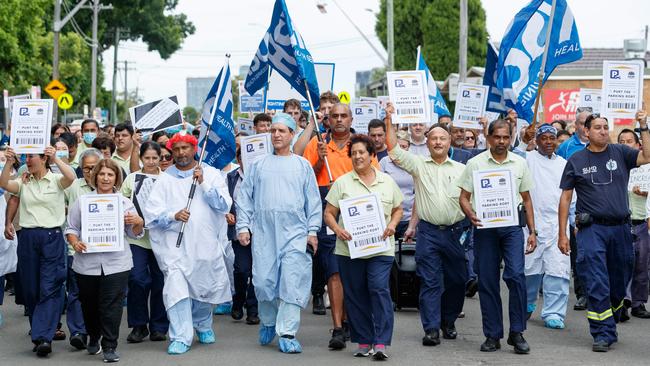‘Unsatisfactory state of affairs’: report calls for hospital overhaul
NSW must lobby for a better federal hospital funding deal, an independent report prompted by a toxic dispute between medical workers and hospital administrators has recommended.

A long-awaited report into the NSW health system prompted by a toxic dispute between medical workers and hospital administrators has made 41 reform recommendations aimed at improving patient outcomes.
The Special Commission of Inquiry into Healthcare Funding’s final report, made public on Friday, urges the state to seek a greater share of federal funding to better support primary and aged care.
The inquiry was prompted, in part, by an uprising at Concord Hospital in Sydney’s inner west after the staff council passed a vote of no confidence in the hospital’s leadership.
It was seen to be symbolic of much deeper problems across the nation’s health sector that have prompted droves of doctors and nurses to walk away from public healthcare.
At the crux of the Concord mutiny was intensive care physician and medical staff council head Winston Cheung.
Dr Cheung was vocal about the desperation and disillusionment of Concord staff, whose alleged mistreatment had caused flow-on effects in the quality of patient treatment.
Through this journey from internal disquiet to open rebellion, Dr Cheung was threatened with a code of conduct violation and a failed vote of no confidence for allegedly exceeding the authority given to medical staff councils.
Despite this, he emerged from the final report vindicated in the eyes of Commissioner Richard Beasley.
While Mr Beasley did “not consider it necessary to make findings” on the Concord civil war itself, he ruled it “was an unsatisfactory state of affairs for the relationship between the clinicians comprising the hospital’s medical staff council and hospital and district executives to deteriorate to the point they did”.
He said unclear model by-laws governing staff councils presented by the state department allowed the discord to grow to the level it did, while questioning how the hospital’s executive level decided to crack down on workers. “The difficulties that arise from those features of the model by-laws can have real impact,” the report reads.
“Until a vote of no confidence in the chief executive was passed, the Ministry of Health seems to have been unaware of the issues that had arisen at that hospital. That is not satisfactory … What occurred at Concord in that period was not the norm.
“The underlying concern of management, however, seems to have been that through the terms of reference, the medical staff council was attempting to elevate itself above an advisory role. Quite how that could have occurred remains unclear to me.
“What is clear to me, however, is that a great deal of tension resulted from there being no clear identification of the role and functions of the medical staff council in the model by-laws. That, in turn, created the environment in which the dispute arose and then escalated.”
Mr Beasley suggested medical staff councils be ascribed a clearer role, with the model by-laws governing them articulated to prevent another hospital reaching Concord’s level of disunity in future.

The Special Commission of Inquiry into Healthcare Funding itself was an election pledge made by the Minns government.
“The NSW health system is one of the highest performing in the world, supported by the most talented and dedicated clinicians and workers,” Health Minister Ryan Park said.
“It doesn’t mean we don’t have our challenges, and it doesn’t mean we can’t find more ways to improve. It is now time to give the findings and recommendations of this report the consideration it deserves.”
The final report spans four volumes spread over more than 1000 pages. Mr Beasley describes it as being an inquiry into how a government service might be improved rather than an examination of government failures. He ultimately concludes the state’s health sector requires more money.
“If universal healthcare is the aim of the NSW public health system, at least parts of that system are underfunded. They have been for some time,” he writes.
Expanding on that, he says yet more funding will be required if the government is to implement his recommendations.
“That funding should be ongoing, in addition to NSW Health’s existing budget allocation, and quarantined for those purposes.”
Mr Beasley recommended preventive health be made a government priority and that the state pursue commonwealth funding for improvements to both primary and aged-care delivery.
The issue of funding appears to be a point of contention. On Thursday, NSW Premier Chris Minns called on the commonwealth to uphold its obligations.
“The commonwealth’s got deeper pockets; they’re responsible for primary healthcare,” he said. “The commonwealth government’s been elected with a big mandate to save Medicare and primary healthcare and, like every voter, we’re going to hold them to that.
“It’s incredibly important to deliver on those promises because every time we don’t have a patient who’s able to access bulk-billing or their local GP, where they end up is the emergency department.”
Mr Beasley also recommends the government scrap short-term funding cycles for Aboriginal Community Controlled Health Organisations, especially where programs are ongoing, and for governance and funding for statewide services to be controlled by the state rather than local health districts.

Other recommendations focus on functionality within health, including for there to be a single digital patient record, funded by both the state and commonwealth. He would also like to see a statewide plan for paediatric services and for a further independent review into psychological care in justice settings.
The report has been welcomed by the Health Secretary Susan Pearce, who said while the report raised a lot of positives, it also pointed to problems.
“We work in a huge and complex public health system and there always has been and always will be room for improvement and innovation, as we strive continuously to enhance patient experiences and outcomes,” she said.
“We have longstanding recruitment issues, particularly in regional, rural and remote areas, which are challenging for staff and communities in these areas, as well as in some clinical areas and practice disciplines. This continues to be an area of focus.
“So while I am the first to acknowledge that we have significant challenges to address, it is also true that we are addressing all these challenges from a position of strength, with one of the best healthcare systems in the world, staffed by the best workforce in the world.”
Mr Beasley has recommended she provide the government with six-monthly progress reports on any recommendations that get accepted.
Gerard Hayes from the Health Services Union said the report provided the cornerstones needed to “fundamentally shift” the healthcare system.
“We know the future of healthcare is in allied and preventive care, which will keep people out of hospital and help them recover faster,” he says.
“Shifting our attention from costly emergency and surgical intervention to allied and preventive care will save money and improve peoples’ health, which is not only good for individuals but for the wider community.”
The NSW government has previously vowed to respond to the report within six months.





To join the conversation, please log in. Don't have an account? Register
Join the conversation, you are commenting as Logout